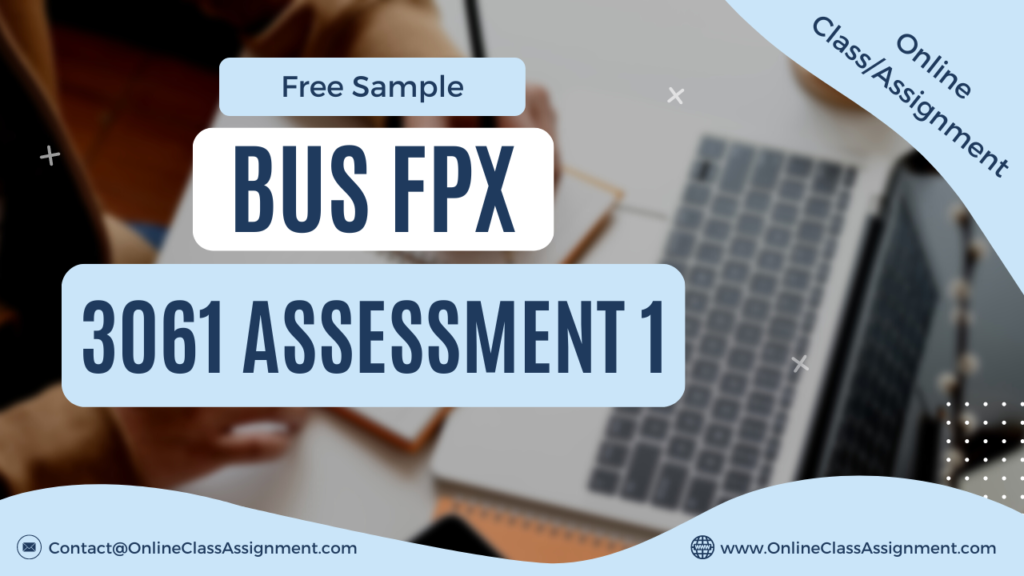
BUS FPX 3061 Assessment 1 Accounting Environment
Student Name
Capella University
BUS-FPX3061 Fundamentals of Accounting
Prof. Name
Date
Role of Ethics in an Accounting System
The role ethics plays in an accounting system is paramount, as it ensures the provision of truthful, reliable, and fair reporting of a company’s financials. Professional accountants are tasked with identifying, selecting, and implementing appropriate authoritative procedures for reporting financial information. Given the highly confidential nature of financial data, accounting professionals must adhere to ethical standards, refraining from discussing transactions openly outside of their department without considering the ethical implications of disclosure. The Financial Accounting Standards Board (FASB) has established generally accepted accounting principles (GAAP) to guide the profession in making ethical choices. These principles, alongside other professional codes, emphasize honesty, objectivity, confidentiality, and moral conduct in the performance of accountants’ duties (Yarahmadi & Bohloli, 2015).
Scenario 1
In this scenario, the accounting conventions of conservatism, consistency, and full disclosure are applicable. If Acme were to contemplate reducing its expense calculations to enhance net income, it would violate the conservatism convention, which dictates anticipating no profit. Altering expense calculations could disrupt vertical consistency when comparing financial statements across previous years. However, if such a change were made, full disclosure would be imperative to allow stakeholders to meaningfully compare financial statements without prejudice (Accounting Basics for Students, 2013).
Scenario 2
The relevant accounting conventions for this scenario include consistency and full disclosure. Depreciating one asset more rapidly than usual undermines both vertical and horizontal consistency in financial reporting. The company should consider standardizing the depreciation method for all assets to maintain consistency and provide full disclosure regarding any changes made (Fields, 2011).
Scenario 3
For this scenario, consistency and full disclosure are the applicable accounting conventions. A one-time change in accounting method does not inherently violate ethical standards. However, Bozrah Industries should ensure dimensional consistency when comparing different business entities for the same period. Any changes made should be accompanied by a footnote and full disclosure in the year-end financial statements (Yarahmadi & Bohloli, 2015).
BUS FPX 3061 Assessment 1 Accounting Environment
Scenario 4
In this scenario, the accounting conventions of conservatism, materiality, and full disclosure are pertinent. Understating income to present the company as more profitable violates the conservatism convention, which dictates anticipating no profit. Additionally, the principle of materiality stipulates that relevant information, such as a $10,000 omission, must be disclosed to users of accounting information. Rectifying this situation requires amending financial statements to fully disclose the changes made (Fields, 2011).
Scenario 5
Changing the accounting system due to customer defaults raises concerns about the conservatism convention. Accrual accounting, which recognizes revenues when earned and expenses when incurred, should not be affected by contract defaults. Instead of altering the accounting system, the company should review its credit approval and collections process to mitigate such risks (Accounting Basics for Students, 2013).
Scenario 6
Senior managers’ reluctance to disclose potential liabilities from lawsuits violates the accounting conventions of consistency and full disclosure. Failure to disclose such material facts impedes stakeholders’ ability to make decisions based on dimensional consistency. Charter Communication should provide full disclosure of lawsuits in its financial statements to ensure transparency and adherence to ethical standards (Yarahmadi & Bohloli, 2015).
References
Accounting Basics for Students. (2013). Retrieved from http://www.accounting-basics-forstudents.com/
Fields, E. (2011). The essentials of finance and accounting for nonfinancial managers (2nd ed.). New York, NY: AMACOM Books.
Yarahmadi, H., & Bohloli, A. (2015). Ethics in accounting. International Journal of Accounting and Financial Reporting, 1(1), 356. doi:10.5296/ijafr.v5i1.7829
BUS FPX 3061 Assessment 1 Accounting Environment
Get Capella University Free Business Samples
BUS FPX 3007
BUS FPX 3011
BUS FPX 3021
BUS FPX 3022
BUS FPX 3030
BUS FPX 3040
BUS FPX 3050
BUS FPX 4012
